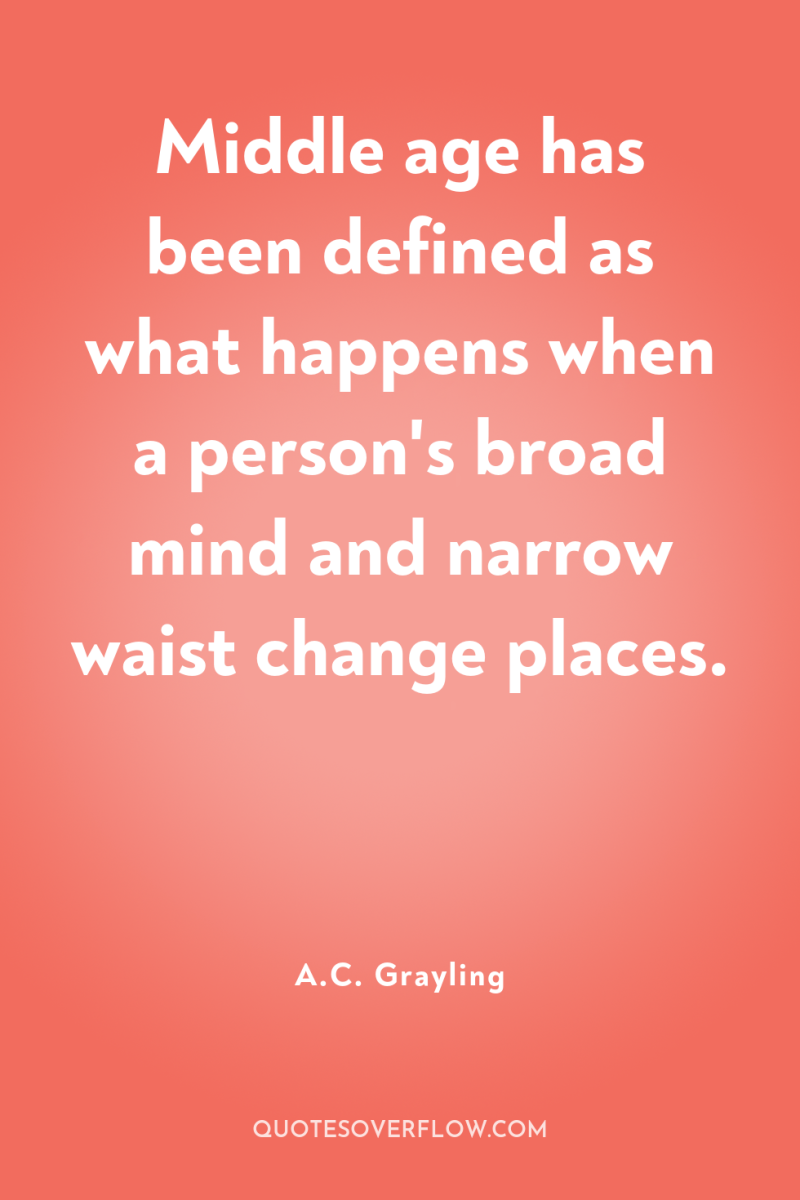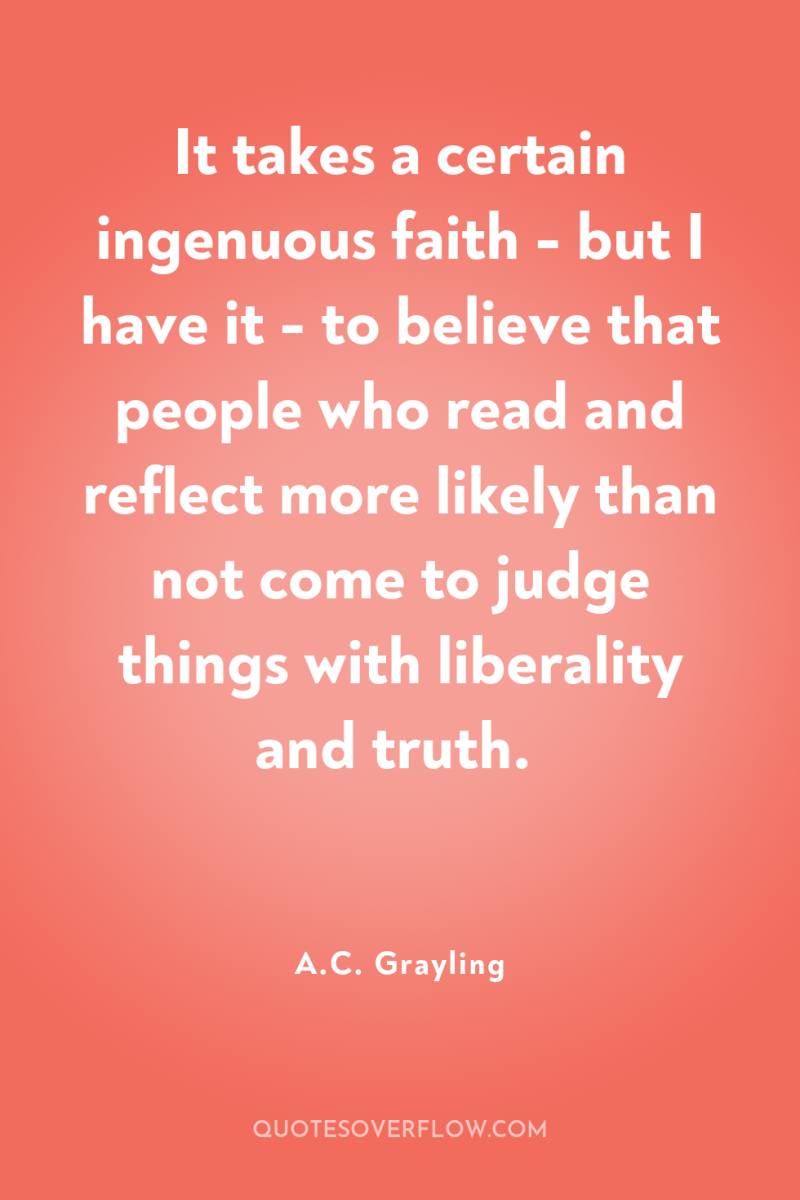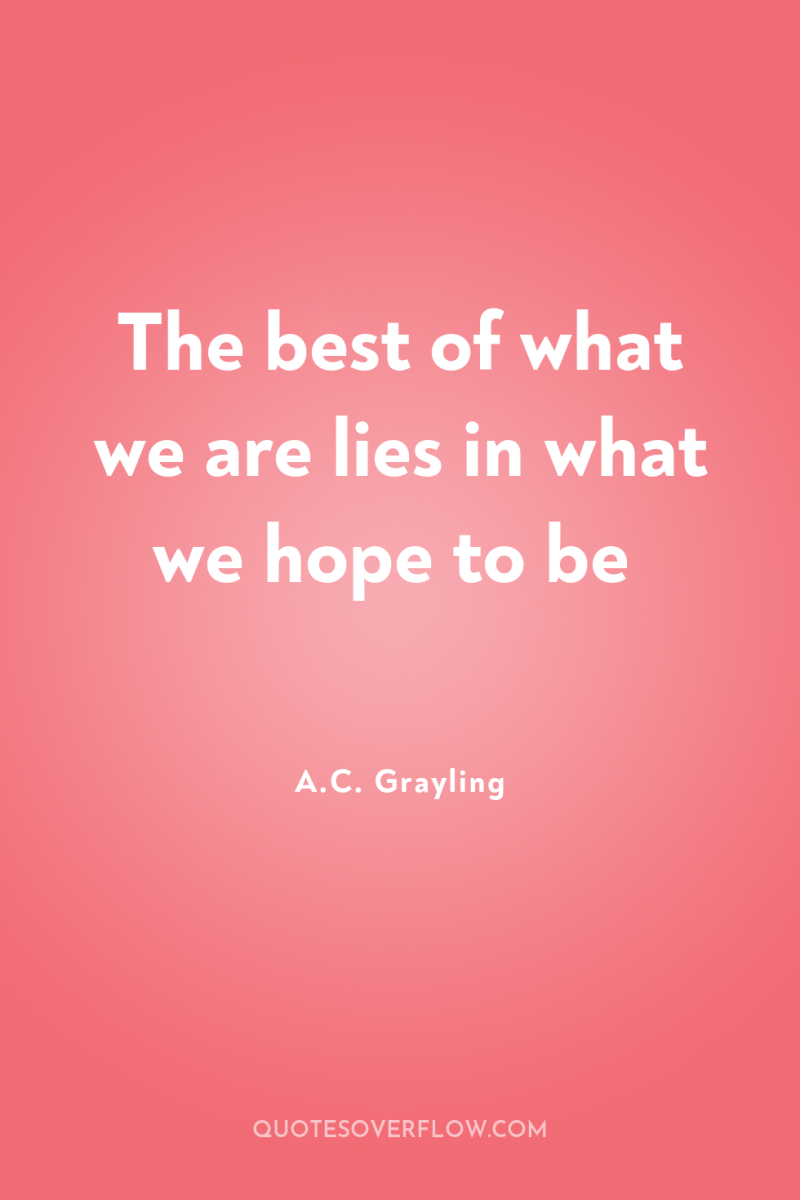
1
Middle age has been defined as what happens when a person's broad mind and narrow waist change places.A.C. Grayling

2
It takes a certain ingenuous faith - but I have it - to believe that people who read and reflect more likely than not come to judge things with liberality and truth.A.C. Grayling

3
The best of what we are lies in what we hope to beA.C. Grayling
4
Do not regret having lived, but while yet living live in a way that allows you to think that you were not born in vain. And do not regret that you must die: it is what all who are wise must Wish, to have life end at its proper time. For nature puts a limit to living as to everything else, And we are the sons and daughters of nature, and for us therefore the sleep of nature is nature's final kindness .A.C. Grayling
5
Just as modern motorways have no room for ox-carts or wandering pedestrians, so modern society has little place for lives and ways that are too eccentric.A.C. Grayling
6
If there is a deity of the kind imagined by votaries of the big mail-order religions such as Christianity and Islam, and if this deity is the creator of all things, then it is responsible for cancer, meningitis, millions of spontaneous abortions everyday, mass killings of people in floods and earthquakes-and too great mountain of other natural evils to list besides. It would also, as the putative designer of human nature, ultimately be responsible or the ubiquitous and unbeatable human propensities for hatred, malice, greed, and all other sources of the cruelty and murder people inflict on each other hourly.A.C. Grayling
7
.the most important philosophical question we can each ask ourselves is, ‘Do I or do I not wish to commit suicide?’ If we say, ‘No I do not, ’ as most of us would, it is because we have reasons for living, or at the very least real hope that we can find such reasons. Then the next question is: what are the reasons I personally have for saying ‘No’ to that question? The answer contains the meaning of my life.A.C. Grayling
8
For the grace of bearing life's inevitable evils is itself agood, and makes goodness arise even from evils byopposing them or enduring them with courage.A.C. Grayling
9
I once had a published written debate with a religious apologist who, after I had argued the standard line that the idea of a loving and merciful deity is inconsistent with the fact of natural evil, said this meant his god was not all-powerful, and therefore was not to blame because it could not stop natural evil from occuring. This is a different tack from the more robust one that says natural evil is a response to humanity's moral evil. What this latter view in effect argues is that because of (say) Hitler's wrongdoings, thousands of babies deserve to be drowned in tsunamis.A.C. Grayling
10
Socrates famously said that the unconsidered life is not worth living. He meant that a life lived without forethought or principle is a life so vulnerable to chance, and so dependent on the choices and actions of others, that it is of little real value to the person living it. He further meant that a life well lived is one which has goals, and integrity, which is chosen and directed by the one who lives it, to the fullest extent possible to a human agent caught in the webs of society and history.A.C. Grayling
11
A mature society is one that reserves its moral outrage for what really matters: poverty and preventable diseases in the third world, arms sales, oppression, injustice. Bad language and sex might offend some, who certainly have a right to complain; but they do not have a right to censor. They do not have to watch or listen if they are offended: they have an 'off' button on their television sets and radios. After all, it is morally outrageous that moral outrage should be used as an excuse to perpetrate the outrage of censorship on others. .A.C. Grayling
12
Theistic claims that supernatural agency exists in the universe derive from ancient traditions of belief. The word 'atheist' is a theist's term for a person who does not share such beliefs. Theists think that atheists have a belief or set of beliefs, just as theists do but in the opposite sense, about theism-related questions. This is a mistake; atheists certainly have beliefs about many things, but they are not 'theistic-subject-matter-related beliefs' in any but a single negative sense. For atheism is the absence of 'theistic-subject-matter-related belief. Although it is true that 'absence of belief in supernatural agency' is functionally equivalent to 'belief in the absence of supernatural agency', theists concentrate on the latter formulation in order to make atheism a positive as opposed to privative thesis with regard to theistic-subject-matter-related matters. This is what makes theists think they are in a kind of belief football match, with opposing sets of beliefs vying for our allegiance. What is happening is that the theists are rushing about the park kicking the ball, but the atheists are not playing. They are not even on the field; they are in the stands, arguing that this particular game should not be taking place at all.A.C. Grayling
13
What sort of charge against old age is the nearness of death, when this is shared by youth? Yes, you will say; but a young man expects to live long; an old man cannot expect to do so. Well, the young man is a fool to expect it. For what can be more foolish than to regard the uncertain as certain, the false as true? An old man has nothing even to hope. ' Ah, but it is just there that he is in a better position than the young man, since what the latter only hopes he has obtained: The one wishes to live long; the other has lived long. And yet! what is 'long' in a man's life? For grant the utmost limit: let us expect an age like that of the king of the Tartessi, who reigned eighty years and lived a hundred and twenty. Nothing seems long in which there is any. last' , for when that arrives, then all the past has slipped away -only that remains which you have earned by virtue and righteous actions. Hours indeed, and days and months and years depart, nor does past time ever return, nor can the future be known. Whatever time each is granted for life, with that he is bound to be content.A.C. Grayling
14
Misuse of reason might yet return the world to pre-technological night; plenty of religious zealots hunger for just such a result, and are happy to use the latest technology to effect it.A.C. Grayling
15
Perhaps worse still is what liberal societies might do to themselves in the face of this new and different threat [of terrorism]. They begin, by small but dangerous increments, to cease to be as liberal as they once were. They begin to restrict their own hard-won rights and freedoms as a protection against the crminial minority who attempt (and as we thus see, by forcing liberty to commit suidcide, succed in doing) to terrorise society.A.C. Grayling
16
Without free speech one cannot claim other liberties, or defend them when they are attacked. Without free speech one cannot have a democratic process, which requires the statement and testing of policy proposals and party platforms. Without free speech one cannot have a due process at law, in which one can defend oneself, accuse, collect and examine evidence, make a case or refute one. Without free speech there cannot be genuine education and research, enquiry, debate, exchange of information, challenges to falsehood, questioning of governments, proposal and examination of opinion. Without free speech there cannot be a free press, which..is necessary..as one of the two essential estates of a free society (the other being an independent judiciary).A.C. Grayling
17
If there is anything worth fearing in the world, it is living in such a way that gives one cause for regret in the end.A.C. Grayling
18
Those who think that modern times are wickeder than previous times are apt to identify the cause as the weakening of a sense of moral law, associated with the departure of religious traditions of morality as a social influence.. Such views give comfort to apologists for religion, who fasten on the implication that to revive a culture of moral concern people must be encouraged back into churches. But this reprises the usual muddle that getting people to accept as true.. such propositions as that at a certain historical point a virgin gave birth, that the laws of nature were arbitrarily suspended so that, for example, water turned into wine, that several corpses came to life (and so forth), will somehow give them a logical reason for living morally (according to the attached view of what is moral - e.g. not marrying if you can help it, not divorcing if you do, and so forth again). It is scarcely needful to repeat that the morality and the metaphysics here separately at stake do not justify or even need one another, and that the moral questions require to be grounded and justified on their own merits in application to what they concern, namely, the life of human beings in the social setting.A.C. Grayling
19
It is always a mistake to underestimate how long it takes for mankind to understand the traumas it has suffered, especially the self-inflicted ones.A.C. Grayling
20
Future generations may or may not judge Wittgenstein to be one of the great philosophers. Even if they do not, however, he is sure always to count as one of the great personalities of philosophy. From our perspective it is easy to mistake one for the other; which he is time will tell.A.C. Grayling